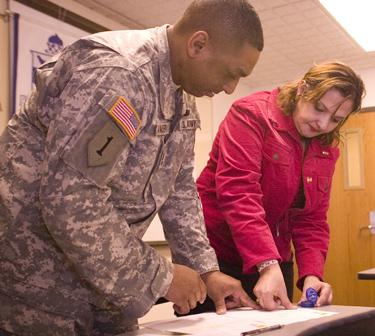VIDEO: Professor enlists in Army Reserve
February 19, 2009
Bassima Schbley, a Professor of Social Work at Washburn University, was born and raised as the oldest of 12 in Beirut, Lebanon, but at 16, her circumstances changed when she married her soulmate, a member of the American Special Forces. She traveled back to Austin, Texas, with him.
Schbley set her sights on becoming a member of the United States Army Reserves. On Monday, Feb. 9, that dream came true.
She moved from Austin to Dallas, and from Dallas to Wichita. From there, she settled in Topeka, where she assumed her position at Washburn University.
“In my country it is permissible to be in the military, but it wasn’t when I was there,” said Schbley. “I was born in Lebanon, and I love Lebanon, but it was the United States that molded and shaped me into who I am today. The United States gave me the opportunity to pursue an education, which was very important to me, and joining the Army Reserves gives me the opportunity to give back to the U.S.”
She appreciates freedom, and she knows that freedom comes at a cost.
For reserve members, above all they are required to be a good citizen and do the right thing, for the right reasons at the right time.
In the near future, Schbley will be traveling to San Antonio to spend six weeks in boot camp. She feels her experiences in social work will help her in a number of ways.
“I really believe that I am a people person, so I will be able to relate to the soldiers who suffer from mental illness, such as post traumatic stress syndrome,” said Schbley. “I also speak Arabic; therefore, they may be able to use my services as a translator.”
She feels the move will be beneficial in other ways as well.
For example, her dream was to get a Ph.D., which she accomplished, but becoming an officer was an even greater dream of hers. She now wants to be a role model for her two sons, and also for women. She wants women to realize they can do anything a man can do.
Not all of her relatives are supportive, though.
“I face opposition from my extended family back in Lebanon,” said Schbley. “They feel as if I am betraying my country of origin, as well my Muslim beliefs. If I were to be deployed to the Middle East, they say I would be fighting my own people.”
Her family life here will change with the new structure that being in the Reserves brings. Schbley was already organized, but now her weekends will be more regimented, forcing her to schedule time with her children.
Schbley said in her youth, she was restricted in some ways.
“I had a lot of limitations as an innocent 16-year-old Muslim girl,” said Schbley. “My father and uncle made all of my decisions for me.”
She had at one point dreamed of being a flight attendant, which she eventually pursued, but that was a short-lived experience. A few months after starting a job that her family considered “sleezy,” her father had a heart attack.
“They told me that it was my fault, and that if he died, I would be the one to blame,” she said.
Schbley just published a book called “Women and Civil Rights: Religious Authority and Female Oppression.”
She wants to encourage everyone, men and women, to consider joining the military because there is a great need for doctors, nurses, psychologists, and social workers.
“With our new President, there is lots of hope for our country,” said Schbley. “Instead of destroying and killing smaller countries, we will help them.”



